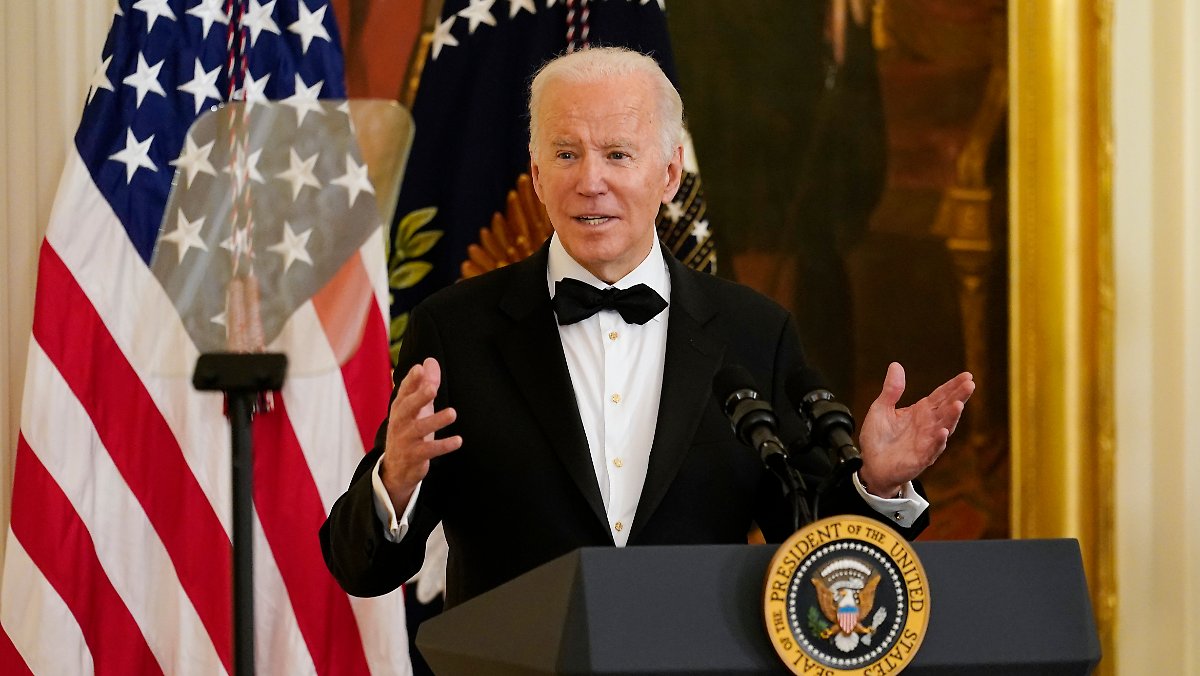Despite threats from China
The United States announces its political boycott of the Olympic Games
December 7, 2021, 5:10 am
The pressure has been building up for months. Now it’s official: The United States announces a diplomatic boycott of the Winter Olympics in China. This does not have an effect on the participation of American athletes, but it does have an effect on the relations between the competing great powers.
The United States announced its diplomatic boycott of the Beijing Winter Olympics as a sign of its dissatisfaction with the ongoing “genocide” in the Xinjiang Autonomous Region and other human rights abuses. US President Joe Biden or any other US official will not travel to the February 2022 matches. This was announced by the White House in Washington. Reports of the impending boycott announcement have already caused diplomatic tensions between the two superpowers in the past few days.
White House spokeswoman Jen Psaki said the US government will encourage American athletes in their homes. When asked why the US government refrained from a complete boycott of the Games, Psaki said she did not want to penalize athletes who trained extensively for the Games. The government believes that this step also sends a “clear message”. Psaki emphasized that the US government informed international partners of the decision and left them to make their own decisions.
So the diplomatic boycott allows American athletes to compete in the Winter Olympics, but it’s a calculated disdain for America’s biggest economic rival. Pressure on the US government has been built up and maintained in recent months by Democrats, Republicans and human rights activists, but also by athletes such as NBA star Enes Kanter Freedom. US President Biden had already talked about a possible boycott in November.
In its first reaction, the IOC described the government officials’ presence as “a purely political decision, which the IOC fully respects in its political neutrality”. A spokesman for the International Olympic Committee said, referring to the United Nations resolution, which was adopted unanimously for all 193 members states. This resolution includes compliance with the Olympic Truce for the Beijing 2022 Olympic and Paralympic Games and calls on all member states to work with the IOC and the International Paralympic Committee in their efforts to use sport as a tool to promote peace, dialogue and reconciliation in the regions. Conflict during and after the Olympic Games and its use.
Nor does New Zealand send diplomats to Beijing
The US announcement was followed by other international reactions to the decision. Nor does New Zealand want to send diplomatic representatives to Beijing in February. As Deputy Prime Minister Grant Robertson explained, the ongoing pandemic is one of the main reasons for the decision: “We have made our concerns about human rights issues to China on numerous occasions – the prime minister recently spoke to President Xi about this,” according to state broadcaster TVNZ, Robertson said. “China knows very well our position on human rights, but we have already decided not to participate,” the New Zealand deputy prime minister said, adding that China was informed of the decision in October.
The Australian and Japanese governments announced that they still wanted to discuss the issue of sending a diplomatic representative. Japanese Prime Minister Fumio Kishida said on Tuesday that his country will take a number of factors into consideration when making a decision. These include the purpose of the Olympics, diplomatic status and Japan’s national interests, Kishida said. Canada’s Foreign Ministry said Canada was “deeply concerned” by reports of human rights abuses in China. “We have been informed of the US decision and will continue to discuss this matter with our partners and allies,” the ministry said. The only head of state to have accepted China’s invitation to attend the Games so far is Russian President Vladimir Putin.
China threatens ‘countermeasures’
China recently threatened the United States with “decisive countermeasures” in the event of a political boycott of the Beijing Winter Olympics in February. Following reports of Biden’s considerations, Chinese Foreign Ministry spokesman Zhao Lijian responded with sharp criticism early Monday. Even before the US politicians were invited, the spokesman said, “they are exaggerating the boycott issue.”
“It is a mockery of the Olympic spirit, a political provocation and an attack on 1.4 billion Chinese,” Zhao Lijian told the press in Beijing. It will only make the Chinese people and the world see more clearly the hypocrisy and anti-Chinese nature of American politicians. China has been criticized for its human rights abuses, including its treatment of minorities such as Uyghurs and Tibetans and its suppression of the pro-democracy movement in Hong Kong.
Also unrest in Germany
Germany’s designated foreign minister, Annallina Barbock, also brought up the topic of the boycott in an interview with Taz last week. “When I see how the Chinese leadership deals with tennis player Peng Shuai or arrested citizen journalist Zhang Zhan, we must of course take a closer look at the Olympics. There are different ways of dealing with governments that will be discussed in the coming weeks for sure,” Barbock said.
This led to a sharp response from the new president of the German Olympic Sports Federation (DOSB). Immediately after his election last Saturday, new President Thomas Weckert recommended the designated federal secretary of state to choose her words more carefully going forward. “Mrs. Burbock should leave the church in the village, I’ll say it very clearly,” said Weckert, who was not referring to a possible diplomatic boycott. For athletes who are now preparing for a long time.”

“Internet nerd. Avid student. Zombie guru. Tv enthusiast. Coffee advocate. Social media expert. Music geek. Professional food maven. Thinker. Troublemaker.”






More Stories
Why isn’t England competing in the Olympics, but Great Britain?
Basketball star James carries the American flag at the start of the Olympic Games.
Best Athletics in Lucerne – Kampondji, Kalin, Lobalu and Moser win in Lucerne – Sports